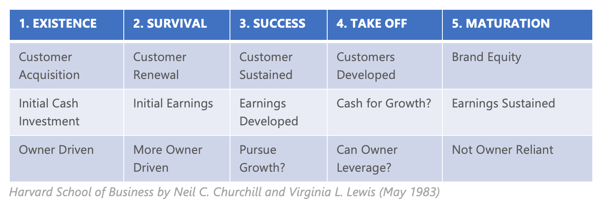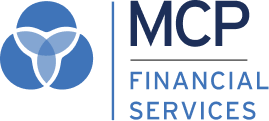This article considers the challenge of growing a business when the working owner reaches capacity.
The "Single Owner Cap"
A common challenge for any growing business is a concept we call the "Single Owner Cap".
This refers to the inability for an owner(s) to grow beyond a certain size. This is understandable - as the volume of clients and management activity increases, so too does the personal exertion required to support it.
This Cap is usually linked to the manner and structure in which the business earns income.
There is a lot of good research on Stages of Business. I like the Harvard research which looks at five (5) succinct stages and the traits of each, as below:

For some SMEs, this is a journey that can look something like this:
- Stage 1 & 2 of starting and building a business, whilst challenging, is often the easiest in terms of growth (not distracted by client maintenance / staff / management etc).
- There is a cluster of SMEs at at "Success" (Stage 3) that are unable to achieve "Take Off" (Stage 4).
- Owners reach saturation, have squeezed their operational tasks and costs as far as possible.
- Cannot build leverage in managing or attracting new customers at a rate that drives sustained growth.
At this point, it may be relevant to acknowledge that there is nothing wrong with taking a SME to Stage 3 (Success). After all, this may be the intended destination for the business.
If, alternatively, the owners want to grow the business, typically the inability to create "leverage" is a key restraint.
The Power of Leverage
Strongly related to the Business Test we discussed in Small Business Success - Part 2, is the "Power of Leverage".
Leverage, in our mind, is a critical component for any business that seeks growth, or for owners that want to be, or develop into, a "Business" rather than solely operating in the mode of "Self-Employment".
The Merriam Webster Dictionary defines Leverage as: "Influence or power used to achieve a desired result".
In the context of business, we define it as the ability to do more of what you do well.
For example, there are many highly paid professionals, that can be self-employed and make exceptional personal financial returns. However, their ability to leverage is limited. How easily can they train people in their organisation to see more clients? Yes, they can be more efficient and get some support, but ultimately, they need to be applying their own personal exertion to generate income.

Early in our own journey of self-employment, a story made a lasting impression. A close friend's father was self-employed as a Plumber. He had an excellent reputation for over 30 years in his local area, with repeat customers. When he wanted to retire, there was however no sustainable business to sell. It was all based on his personal exertion and the tight personal relationships he held with the customers.
What we are talking about here is leverage.
Leverage can either allow a business to stay small and not be at all solely reliant on the owner, or it can build a system for its growth.
The best businesses we have seen are the ones that "do it often, do it well". Repeatable processes that are supported by great marketing & sales programs, systems, great internal culture and customer service, but that don't unduly rely on individual expertise at an operational level or "black art".

There can be great leverage opportunities in these types of organisations. Whatever the owners' motivation, the operation will be more saleable if the business operates without undue reliance on the owner, and there is opportunity for leverage.
Lastly, and most significantly, the essence of many SMEs reflect their founders. That can be a strength and weakness in equal measure. I always recall a quotation from the creative genius Paul Arden, "Your vision of where or who you want to be is the greatest asset you have".
It is very important to keep this in mind with all the inevitable distractions that can arise along the joinery.
More Information?
E - enquiry@mcpgroup.com.au
W - mcpfinancial.com.au

